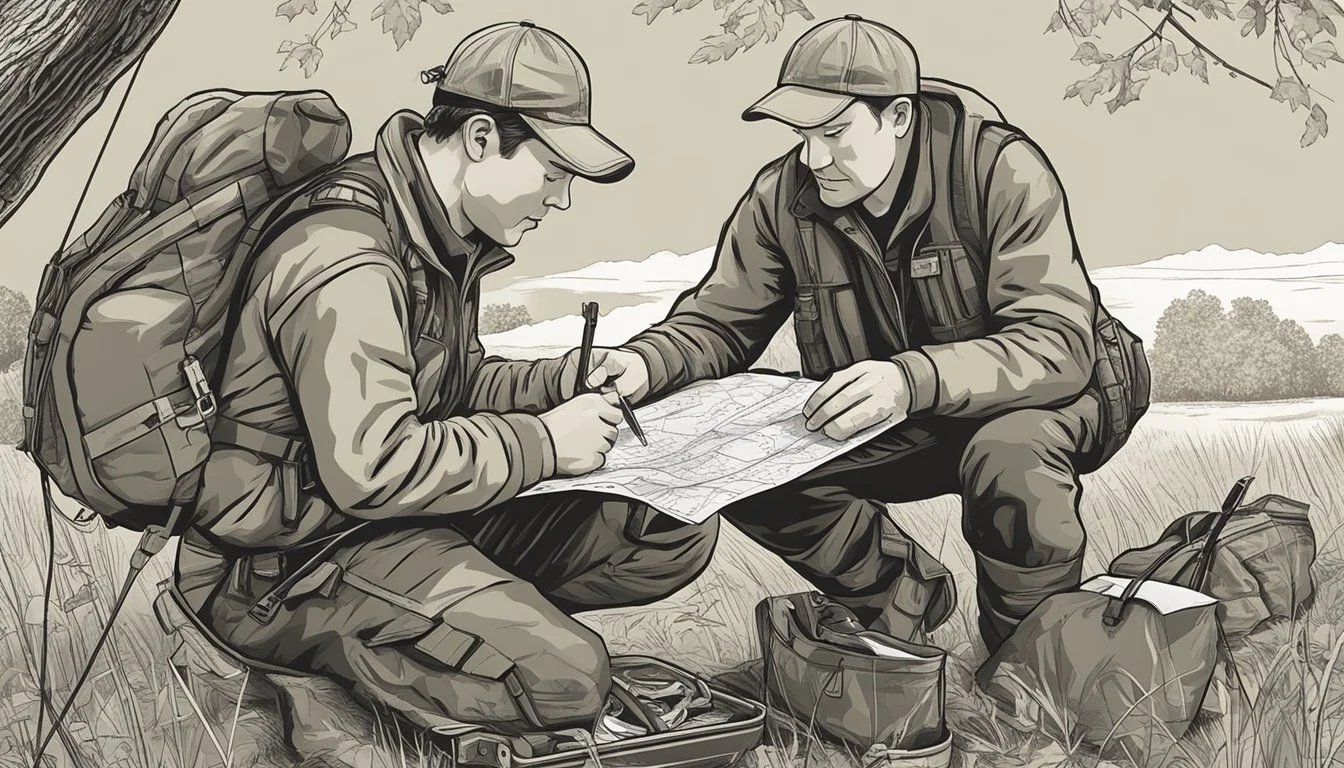Hunting Leases Iowa
Your Guide to Securing Prime Hunting Grounds
Iowa has become a prime destination for hunters seeking quality game, particularly whitetail deer. The state offers abundant opportunities through a system known as hunting leases. These leases are agreements in which landowners allow hunters access to their property for hunting purposes, in exchange for a fee. The arrangement benefits hunters with exclusive access to prime hunting grounds, and landowners with a way to generate income from their land without having to develop or farm it.
The market for hunting leases in Iowa is diverse, with options ranging from farmlands rich in row crops that attract game, to mature timberlands that provide ideal habitat for deer and turkey. The state's commitment to herd management and robust game laws has led to an environment where more mature bucks can be found. As a result, hunting leases can offer a chance at trophy-sized deer, increasing their appeal to serious hunters.
Leasing hunting rights has become a strategic approach to managing wildlife populations and maintaining the delicate balance between agriculture and conservation. These leases are often seen as a partnership that can help protect crop damage from wildlife while also preserving the natural habitat. The success of the hunting lease system in Iowa continues to grow as it aligns the interests of hunters, landowners, and wildlife management.
Understanding Hunting Leases in Iowa
Hunting leases in Iowa are contractual agreements that allow hunters access to private lands for hunting. Such arrangements benefit landowners by providing an additional income stream while enabling hunters to pursue game in a managed environment.
Types of Hunting Leases
Exclusive Leases: These leases typically grant a single individual or group the right to hunt on the land for a specified period. Under exclusive contracts, the lessee has greater control over their hunting experience.
Seasonal and Short-Term Leases: As the names suggest, seasonal leases cover an entire season whereas short-term leases might be for a few days. This flexibility allows for a variety of hunting experiences.
Legal Framework and Regulations
Lease Agreements: It is important to understand that in Iowa, most hunting leases are legally regarded as licenses rather than true leases.
Licenses provide the right to use property without granting an estate in real property.
Lease agreements detail the rights and responsibilities of both parties and usually include clauses about insurance requirements to protect both the landowner and the hunters from liability.
Benefits of Leases for Landowners
Additional Income:
Landowners can generate passive income from leasing their land for hunting purposes.
Hunting leases are an attractive option for Iowa landowners given the state's rich trophy buck population.
Contact Us: Landowners interested in exploring this opportunity can find resources and expert guidance by reaching out to hunting lease networks or specialists who can simplify the process.
To conclude, hunting leases in Iowa present a unique opportunity for hunters seeking quality game and landowners aiming to monetize their unused lands. Through clear legal agreements and proper understanding of the regulations, both parties can benefit from this arrangement.
Selecting the Right Location
When securing a hunting lease in Iowa, one must consider county-specific opportunities, wildlife populations, habitat features, and CRP land specifics to ensure a successful hunting season.
County-Specific Opportunities
Different Iowa counties offer unique hunting experiences. For example, Clayton County boasts a diversified landscape with a good mix of row crops and mature timber. Hunters should note that counties like this, with varying landscapes, often attract a dense population of wildlife due to the rich habitat diversity.
Assessing Wildlife Populations
Determining the abundance of wildlife, such as white-tailed deer, before leasing is crucial. Areas near parks and quarries, such as Joy Springs in Clayton County, are known to be frequented by resident deer and attract deer from neighboring areas, indicating robust local wildlife populations.
Natural Habitat and Terrain Features
It's essential to examine the natural habitat and terrain of potential properties. Leases with a variety of timber, including pine, walnut, elm, oak, ash, and other trees are desirable as they provide excellent cover and food sources for wildlife. Sumac growth, loved by deer, should also be considered a positive indicator of a prime hunting lease.
CRP Land Considerations
The Conservation Reserve Program (CRP) lands can be ideal for hunting due to their managed habitats designed to protect the environment and wildlife. However, it is important to understand CRP regulations as they may affect hunting practices. Properties with CRP land should be evaluated on how these areas contribute to the overall quality of the habitat.
Wildlife Management and Habitat Conservation
In Iowa, the intersection of wildlife management and habitat conservation is key to sustaining a balanced ecosystem. These efforts contribute to the health and proliferation of species such as deer and upland game, through measures that include sustainable hunting practices, genetic improvements, and habitat enhancements like water sources and food plots.
Sustainable Hunting Practices
Iowa implements sustainable hunting practices to maintain balanced wildlife populations and prevent overharassment of game species. The state offers hunting leases that allow landowners to manage deer populations effectively. Hunters are encouraged to follow established seasons and adhere to bag limits, which are designed to sustain animal populations at healthy levels.
Improving Game Population Genetics
The genetics of game populations are enhanced by selective harvest strategies that avoid overhunting of genetically superior animals. By targeting specific demographics within deer populations, such as older, less genetically favorable bucks, hunters can aid in promoting healthier herds with stronger genetic traits.
Water Sources and Food Plots
Managing water sources, like ponds, and creating food plots are fundamental to habitat conservation efforts in Iowa. Water sources provide vital hydration spots for wildlife, while strategically planted food plots with crops like corn offer nutrition. These plots are especially critical during winter, serving as food and cover for species such as deer.
Food sources: Corn and other lure crops
Water sources: Development and maintenance of ponds
Species benefits: Deer, upland game, and other wildlife
These initiatives, coupled with legal protections and conservation easements, fortify the longevity of both game and non-game species, ensuring ample opportunities for fishing, hunting, and wildlife observation for years to come.
Deer Hunting Focus
Iowa offers a wealth of opportunities for deer hunters looking for leases that promise a chance at harvesting white-tailed deer. With a landscape rich in natural habitats and agricultural land, hunters can secure prime hunting ground that caters to both the avid sportsman and the conservation-minded individual.
Iowa's Deer Seasons
The Iowa Department of Natural Resources (DNR) delineates specific deer seasons which include youth, disabled hunter, archery, early muzzleloader, regular gun, and late muzzleloader seasons. Archery season typically spans from October to December and again from late December to January, affording bow hunters a lengthy period to pursue deer. Hunters should verify exact dates yearly as they are subject to change.
Zone-Specific Deer Hunting Strategies
Iowa is divided into a number of hunting zones, with Zone 4 and Zone 5 being iconic due to their high-quality deer genetics and habitat. Zone 7, located in the southern part of the state, is also noted for its deer population. Strategy-wise, hunters in these zones often focus on the edge habitats where agricultural fields meet timber, utilizing scouting techniques and being mindful of prevailing wind directions to avoid detection.
Zone Preferred Habitats Strategic Note 4 Mixed agriculture-timber Focus on crop transitions 5 Predominantly agriculture Plan around peak harvest times 7 Variety of terrains Utilize topographical advantages
Non-Resident Hunting Information
Non-residents interested in Iowa deer hunting leases must be cognizant of the competitive tag draw, specifically for Zone 4 and Non-Resident Zone 5. The tag application period starts in May and is a crucial step for securing the opportunity to hunt. Non-residents are subject to strict quotas and should plan their applications accordingly to increase their chances of a successful draw. Leases are particularly sought after in these zones due to the potential for harvesting trophy bucks.
Accessible information regarding tags and zones is essential for non-residents. Hunters are encouraged to do their due diligence in research and align their lease applications with the tag application period to ensure a seamless hunting experience.
Licenses, Permits, and Legal Considerations
Hunting leases in Iowa require adherence to state-specific regulations and legal requirements. Ensuring compliance with the law is critical for both landowners and hunters, including understanding residency regulations and insurance obligations.
Residency Rules for Hunters
Iowa Resident: An individual who possesses an Iowa residency qualifies for certain benefits and reduced fees associated with hunting licenses. Iowa considers a person a resident if they have lived in the state for at least 90 days. The following outlines the key residency requirements:
Must have a permanent and principal residence in Iowa.
Must not be claiming residency privileges in any other state or country.
License Fees: Residents typically pay lower fees for hunting licenses compared to non-residents.
Insurance Requirements
Liability Insurance: Landowners who lease their property for hunting are advised to have liability insurance. This insurance protects against potential legal action arising from accidents or injuries on their property.
Insurance for Hunters: Hunters may also consider obtaining insurance for personal protection. This is advantageous especially when hunting on leased land where the risks can potentially increase.
Iowa's Recreational Use Statute: In 2013, revisions to the Iowa Recreational Use Statute provided landowners with immunity from liability concerning recreational entrants, which includes those who hunt, as long as no fee is charged. When a fee is involved, such as in hunting leases, this immunity may not apply, underscoring the importance of adequate insurance.
By understanding these legal considerations, including residency requirements and insurance needs, both hunters and landowners can engage in the activity of hunting on leased property responsibly and within the boundaries of Iowa law.
Additional Recreational Opportunities
Beyond deer hunting, Iowa offers a variety of outdoor recreational activities. Hunters can take advantage of diverse game species, while anglers have access to numerous fishing spots across the state's water bodies.
Turkey and Waterfowl Hunting
Iowa provides ample opportunities for turkey hunting with a healthy population that responds well to calls, making it a thrilling experience for beginners and seasoned hunters alike. Spring and fall seasons cater to different hunting preferences, with specific zones designated for turkey hunting activity.
For waterfowl enthusiasts, Iowa's wetlands and rivers offer ideal habitats for a range of species including ducks and geese. These areas are managed to ensure sustainable populations, offering repeat visits and a consistent hunting experience.
Species commonly hunted include:
Eastern Wild Turkeys
Ducks (various species)
Fishing and Land Access
Fishing in Iowa is a popular pastime, given the state's vast network of rivers, lakes, and streams. Anglers can enjoy catching a variety of fish such as largemouth bass, walleye, catfish, and panfish. Public access to these areas is typically granted, though some waters may have specific rules or restrictions.
Access to recreational land is a critical component for both hunting and fishing. Several areas in Iowa allow for public access, though private lands may require specific leases or permissions. It's important for hunters and anglers to familiarize themselves with access rights and seek proper permissions where necessary.
Common fish species include:
Largemouth Bass
Walleye
Channel Catfish
Bluegill and other Panfish
By obtaining the appropriate leases and permissions, outdoor enthusiasts can fully enjoy the bountiful recreational opportunities Iowa has to offer.
Local Hunting Lease Resources
For hunters seeking to secure a spot for the season, Iowa offers a wealth of resources, ranging from local county offices to specialized hunting lease agents. These resources provide vital information and assistance to facilitate the process of leasing hunting land.
Contacting County Offices
In Iowa, the county offices serve as a crucial point of contact for inquiries related to hunting leases. Each county, such as Clarke County, Clayton County, Benton County, Polk, Marion, Warren, and Madison, has its own set of regulations and available lands which can be leased for hunting. Hunters can reach out directly to these offices to:
Obtain up-to-date information on available hunting leases
Learn about local hunting regulations and seasonal information
Understand application processes for leasing land
It is advisable for hunters to contact the following selected county offices for specific local leasing opportunities:
Clarke County Office: Offers support with local hunting lease inquiries and guidelines.
Clayton County Office: Known for a mix of agricultural lands and mature timber, providing diverse habitats.
Benton County Office: Can provide details on hunting leases within its jurisdiction, catering to different hunting preferences.
Finding Hunting Lease Agents
Hunting lease agents specialize in connecting hunters with available leasing options. These agents maintain listings of available properties and can offer personal assistance, including:
Tailoring hunting lease searches to fit hunters' specific needs
Providing detailed information on each lease, such as terrain, game availability, and lease terms
To contact a hunting lease agent, hunters can reach out to:
Contact Us: This service allows hunters to inquire about available leases and offers assistance in listing properties for leasing.
By utilizing the services offered by county offices and hunting lease agents, hunters can efficiently find suitable leases that align with their hunting objectives in Iowa.
Preparing for Your Hunting Trip
When heading out on a hunting lease in Iowa, hunters must prioritize preparation in terms of gear, safety, and clear communication with landowners. Proper preparation ensures a successful and legally compliant hunting experience.
What to Bring
Firearms or bows appropriate for the game being hunted
Ammunition or arrows
Hunting attire suited for Iowa’s weather
Binoculars and range finders
GPS or compass for navigation
Game calls and scent control
Field dressing kit
Vehicles:
Four-wheel drives or ATVs may be required for certain terrains.
Ensure you have a valid driver's license and vehicle insurance.
Safety and Legal Compliance
Protection Measures:
Carry proper safety equipment such as a first aid kit and a blaze orange vest or hat.
Always treat firearms with the respect and caution they require.
Insurance:
Verify that you have hunting lease liability insurance to protect against potential accidents.
Ensure that your insurance policies are up to date and cover all the necessary aspects of your hunting trip.
Legal Compliance:
Familiarize yourself with Iowa’s hunting regulations.
Obtain the required hunting licenses and tags.
Landowner-Hunter Communication
Expectations and Restrictions:
Clarify with the landowner any expectations and restrictions on the use of the land.
Ask about specific boundaries, preferred entry points and any areas that are off-limits.
Contact Information:
Exchange contact information with the landowner.
Coordinate a check-in system to use in case of emergencies or any changes in hunting plans.
Hunting Lease Agreements
In Iowa, hunting lease agreements represent a binding contract that stipulate the terms under which hunters may access private land during designated seasons. These agreements provide clarity and protect both the landowner and the lessee.
Understanding Lease Terms
Lease Duration: The period of time the lease is valid, which could range from a single season to multiple years.
Cost: Determined by the landowner, often based on acreage, quality of habitat, and available game species.
Access Rules: Clearly outlines who can hunt on the property, when, and what methods are permissible.
Insurance Requirements: Leases often require hunters to carry liability insurance to protect both the landowner and the hunters.
Negotiating Lease Agreements
Contact Information: It is vital to provide accurate communication details for both parties to facilitate discussions and resolution of potential issues.
Price Negotiation: Both parties should discuss the lease fee and come to an agreement that reflects the fair value of what is being offered.
Amenities and Improvements: Discuss whether food plots, stands, or other enhancements are included in the lease.
Ensuring Compliance with Lease Terms
Regular Check-Ins: Both parties should agree on regular communication intervals to ensure compliance with the lease terms.
Documentation: All terms must be documented in writing and signed by both parties to ensure there is no room for misunderstanding.
Enforcement: Clear consequences for breach of contract or violations of lease terms must be established to maintain the agreement's integrity.
Case Studies and Success Stories
In examining the outcomes of hunting leases in Iowa, it becomes evident that targeted deer management programs and the subsequent economic stimulation for local communities are among the most significant benefits observed.
Successful Deer Management Programmes
Research and case studies indicate that deer management programs implemented on leased lands in Iowa have successfully balanced deer populations with the available habitat. A prime example within the fabled Zone 5, renowned for its exceptional deer genetics, is a 400-acre lease that applied a strategic mix of timber and CRP to improve deer habitat. They facilitated a higher quality of deer herds by prioritizing sustainable hunting practices and habitat conservation, which enhanced the health and genetics of the deer population in the area.
Economic Impact on Local Communities
The surge of hunting leases not only benefits individual landowners but also the surrounding communities of Iowa, including places like Clarke County. Landowners in these regions generate additional income by leasing their lands for hunting activities. This influx of capital benefits the local economy in various ways:
Accommodation and Retail: With an increase in hunters visiting for lease opportunities, local businesses such as hotels, stores, and restaurants see a boost in sales.
Services: Hunting-related services, from guides to equipment rental shops, experience growth.
Investment in Conservation: A portion of revenue from leases is often reinvested into land conservation efforts, promoting sustainability.
The cooperation between hunters and landowners in places like Clarke County, where a conscious effort is made to maintain the quality of both the deer and their habitat, illustrates that hunting leases offer more than just recreational benefits; they contribute to the region's economic vitality and the preservation of wildlife.





